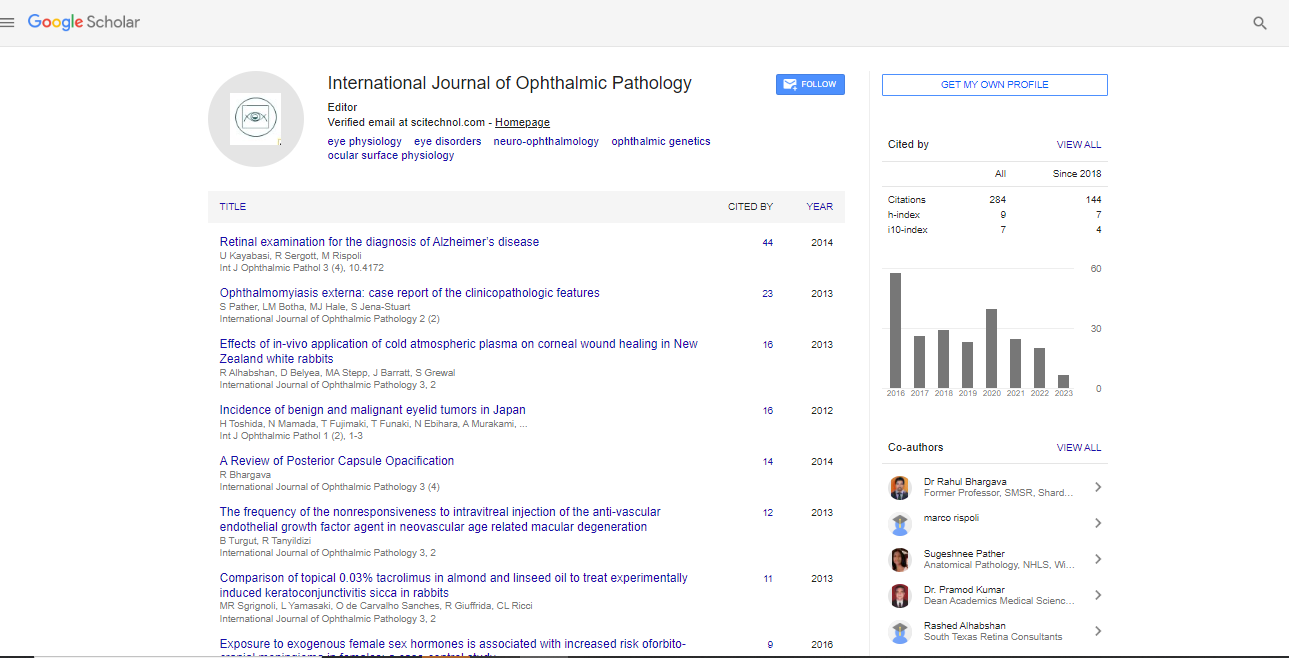Opinion Article, Int J Ophthalmic Pathol Vol: 12 Issue: 5
Genetic Advancement in Ophthalmology-Related Eye Health
Grixti Oetting*
1Department of Ophthalmology, Howard University, Washington DC, United States of America
*Corresponding Author: Grixti Oetting,
Department of Ophthalmology, Howard
University, Washington DC, United States of America
E-mail: grixoett@howard.edu
Received date: 24 September, 2023, Manuscript No. IOPJ-23-121147;
Editor assigned date: 27 September, 2023, PreQC No. IOPJ-23-121147 (PQ);
Reviewed date: 11 October, 2023, QC No. IOPJ-23-121147;
Revised date: 18 October, 2023, Manuscript No. IOPJ-23-121147 (R);
Published date: 25 October, 2023, DOI: 10.4172/2324-8599.12.5.042
Citation: Oetting G (2023) Genetic Advancement in Ophthalmology-Related Eye Health. Int J Ophthalmic Pathol 12:5.
Description
Genetic analysis is revolutionizing the understanding of eye health, exhibiting novel perceptions of the complexities between genetics and ophthalmology. The human eye, a marvel of biological engineering, is supported by a detailed genetic code. Recent advancements in genomic analysis have allowed analysts to decipher the complex systems that control ocular development, function and health. Understanding the genetic blueprint of vision opens avenues for early disease detection, personalized treatment strategies and a deeper comprehension of inherited eye conditions.
Ophthalmic genetics has revealed important insights into the genetic basis of various eye disorders. Conditions such as glaucoma, macular degeneration and retinitis pigmentosa exhibit strong genetic components. Genomic studies are identifying particular gene variations associated with these diseases, paving the way for specialized treatments and precision medicine approaches. Genetic testing is increasingly becoming a valuable tool for assessing an individual's risk of developing certain eye conditions.
Advancements in genetic diagnostics empower clinicians to detect hereditary ocular conditions with formerly rare precision. Through genetic testing, individuals can learn about the susceptibility to conditions like retinal dystrophies, cataracts and congenital eye anomalies. This knowledge not only aids in early diagnosis but also guides treatment decisions. Personalized interventions, informed by a patient's genetic profile, are transforming the management of the hereditary conditions of the eyes.
The era of precision medicine has reached ophthalmology, allowing for customized treatment plans based on an individual's genetic makeup. From gene therapies targeting specific ocular anomalies to personalized pharmacological interventions, precision medicine possesses the potential to enhance the treatment efficacy and minimizing side effects. The genetic information of patients is becoming a foundation of support in the development of novel therapeutics designed to address the root causes of eye diseases.
As genetic testing becomes more accessible, the role of genetic counseling in ophthalmology is gaining prominence. Genetic counselors provide invaluable support to individuals and families navigating the complexities of inherited eye conditions. They provide insights into the genetic basis of ocular diseases discuss potential risks and assist people in getting informed decisions about genetic testing and family planning.
The integration of genetics into ophthalmic care raises ethical considerations surrounding patient privacy, consent appropriate handling of genetic information. Establishing equilibrium between utilization of genetics for improved eye health and safeguarding individual privacy is a vital aspect of this evolving field. Ethical frameworks are essential to ensure that genetic data is accomplished with higher standards of care and in compliance with privacy norms.
The convergence of genomics and ophthalmology has a lot of potential. The analysis is focused on identifying novel therapeutic targets, understanding the genetic modifiers influencing disease progression and developing innovative gene-editing technologies. The genomic era in ophthalmology is able to take charge in transformative treatments, early interventions and a paradigm shift in how people perceive and address eye health challenges.
Conclusion
The fusion of genetic advancements with ophthalmology is reshaping the landscape of eye care. Genetics is leading the way in the search for better vision and ocular health, from identifying the genetic causes of ocular illnesses to developing customized treatment plans. Extending into the genomic era, the convergence of genetics and ophthalmology provides opportunity, especially on the day when therapies focused on maintaining vision will be precisely customized to each person's genetic composition, providing a better quality of life for those with inherited eye disorders.
 Spanish
Spanish  Chinese
Chinese  Russian
Russian  German
German  French
French  Japanese
Japanese  Portuguese
Portuguese  Hindi
Hindi 